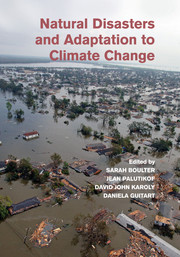15 results
Part II - Case Studies from Australia
-
- Book:
- Natural Disasters and Adaptation to Climate Change
- Published online:
- 05 October 2013
- Print publication:
- 14 October 2013, pp 65-106
-
- Chapter
- Export citation
Natural Disasters and Adaptation to Climate Change - Title page
-
-
- Book:
- Natural Disasters and Adaptation to Climate Change
- Published online:
- 05 October 2013
- Print publication:
- 14 October 2013, pp iii-iii
-
- Chapter
- Export citation
1 - Introduction
-
-
- Book:
- Natural Disasters and Adaptation to Climate Change
- Published online:
- 05 October 2013
- Print publication:
- 14 October 2013, pp 1-5
-
- Chapter
- Export citation
Part V - Synthesis Chapters
-
- Book:
- Natural Disasters and Adaptation to Climate Change
- Published online:
- 05 October 2013
- Print publication:
- 14 October 2013, pp 197-264
-
- Chapter
- Export citation
Copyright page
-
- Book:
- Natural Disasters and Adaptation to Climate Change
- Published online:
- 05 October 2013
- Print publication:
- 14 October 2013, pp iv-iv
-
- Chapter
- Export citation
Contributors
-
-
- Book:
- Natural Disasters and Adaptation to Climate Change
- Published online:
- 05 October 2013
- Print publication:
- 14 October 2013, pp ix-xii
-
- Chapter
- Export citation
24 - Lessons Learned for Adaptation to Climate Change
- from Part V - Synthesis Chapters
-
-
- Book:
- Natural Disasters and Adaptation to Climate Change
- Published online:
- 05 October 2013
- Print publication:
- 14 October 2013, pp 236-251
-
- Chapter
- Export citation
Part I - Case Studies from North America
-
- Book:
- Natural Disasters and Adaptation to Climate Change
- Published online:
- 05 October 2013
- Print publication:
- 14 October 2013, pp 19-64
-
- Chapter
- Export citation
Index
-
- Book:
- Natural Disasters and Adaptation to Climate Change
- Published online:
- 05 October 2013
- Print publication:
- 14 October 2013, pp 265-273
-
- Chapter
- Export citation
Contents
-
- Book:
- Natural Disasters and Adaptation to Climate Change
- Published online:
- 05 October 2013
- Print publication:
- 14 October 2013, pp v-viii
-
- Chapter
- Export citation
Part IV - Case Studies from the Developing World
-
- Book:
- Natural Disasters and Adaptation to Climate Change
- Published online:
- 05 October 2013
- Print publication:
- 14 October 2013, pp 147-196
-
- Chapter
- Export citation
Part III - Case Studies from Europe
-
- Book:
- Natural Disasters and Adaptation to Climate Change
- Published online:
- 05 October 2013
- Print publication:
- 14 October 2013, pp 107-146
-
- Chapter
- Export citation
Preface
-
-
- Book:
- Natural Disasters and Adaptation to Climate Change
- Published online:
- 05 October 2013
- Print publication:
- 14 October 2013, pp xiii-xiv
-
- Chapter
- Export citation
Natural Disasters and Adaptation to Climate Change - Half title page
-
- Book:
- Natural Disasters and Adaptation to Climate Change
- Published online:
- 05 October 2013
- Print publication:
- 14 October 2013, pp i-ii
-
- Chapter
- Export citation

Natural Disasters and Adaptation to Climate Change
-
- Published online:
- 05 October 2013
- Print publication:
- 14 October 2013



